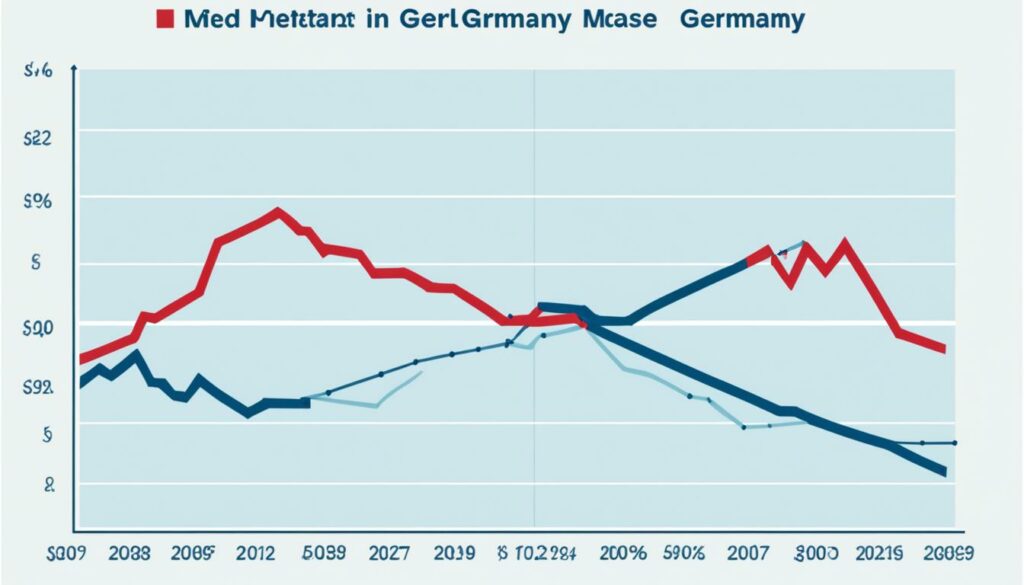In 2024, understanding and embracing future workplace trends is key to achieving career autonomy and career growth. Whether you are a recent graduate or a seasoned professional, staying updated with these trends will offer a distinct advantage in the competitive 2024 job market. As the workplace continues to evolve, it focuses on technological advancements and skill-centered environments1. Individuals are encouraged to approach their careers proactively, much like CEOs of their own career paths, emphasizing personal branding, upskilling, and strategic data-driven decision-making1. This proactive approach is crucial for professional development and ensuring long-term success.
Key Takeaways
- Adapting to future workplace trends is critical for career success in 2024, providing a competitive edge in the job market.
- Career autonomy is increasingly essential, encouraging individuals to act as the CEOs of their career paths.
- There is a significant emphasis on upskilling and continuous learning for career growth and personal development.
- Leveraging data for strategic decision-making can enhance job search strategies and career development1.
- Personal branding remains a vital component for career growth and professional networking1.
Introduction to Career Trends in 2024
The landscape of career trends in 2024 reveals significant shifts emphasizing autonomy, adaptability, and a focus on skills. In a rapidly evolving dynamic job market, professionals need to align with upcoming career trends to gain a competitive edge. Industries such as healthcare, technology, and finance are projected to witness considerable growth, leading to a surge in relevant job roles like data analysts, robotics engineers, and sustainability analysts2.
Emerging job seeker strategies center around understanding these evolving sectors and acquiring the necessary skills. For instance, the demand for AI and machine learning specialists is expected to rise by 40%, adding approximately one million new jobs to the labor market3. Furthermore, green jobs in renewable energy and sustainable agriculture present robust opportunities for career seekers focused on ecological impact2.
Remote work trends are also notable, with only 10% of job listings being remote yet attracting 46% of all job applications as of December 20233. This signals a strong interest among job seekers for flexible, location-independent roles, reinforcing the need for professional empowerment through digital and virtual proficiency.
Professional empowerment in this dynamic job market involves leveraging skill-based hiring practices and demonstrating adaptability to technology and automation changes2. As job roles evolve, aligning career development strategies with these trends ensures better preparedness and success in the workplace.
To stay ahead, understanding the nuances of career management in terms of efficiency, technology, and personal agency is essential. With the right job seeker strategies, professionals can position themselves effectively in the evolving career landscape of 2024.
The Evolution of Workplace Trends
Workplace evolution has progressed from an industrialization era to a modern, tech-centric workforce characterized by flexibility and skill-focused employment models. Significant shifts in workplace trends now emphasize technological adaptability, personal control over career paths, and the ability to work effectively in various environments.
Today, 80% of the global workforce is considered „deskless,“ spending most of their time away from traditional office spaces and computers, necessitating changes in how we approach workplace dynamics4. This trend reflects the broader societal changes and influences business and employee work patterns.
Organizations are increasingly focused on improving the experience of deskless workers by providing access to necessary technology and tools and fostering connectivity and autonomy4. This approach is part of the broader movement towards workplace enablement, ensuring that employees have the resources and influence needed to enhance their work experience.
Another noteworthy trend is the shift towards hybrid work models. According to the World Economic Forum’s Future of Jobs Report 2023, a fifth of organizations believe offering hybrid work is beneficial, and 94% of IT sector companies in the US have already adopted this model5. Despite this, there remains a productivity perception gap, where 80% of individual employees feel very productive in a hybrid setup, contrasted by executives who often value in-office work more5.
In 2024, we can expect to see a rise in efforts to improve the overall experience for the deskless workforce and further advancements in employment models that prioritize flexibility and efficiency4. These employment models will need to become increasingly adaptable, emphasizing the importance of technological proficiency and personal agency within the workplace.
Furthermore, workplace trends are moving towards „nimble resilience,“ with organizations proactively pursuing change and agility in response to new challenges. Leaders are adopting a people-centered approach to change management, involving employees in decision-making processes through various channels4.
The ongoing changes in workplace trends underscore the significance of aligning employment models with the evolving tech-centric workforce. Embracing these advancements allows businesses and employees to thrive in today’s dynamic environment, where technological flexibility and skill-building opportunities are paramount4.
An Ownership Approach to Your Career
In today’s dynamic job market, adopting the mindset of a career CEO empowers professionals to take control of their futures. Effective personal branding plays a crucial role in this process, much like marketing campaigns for businesses. It’s essential to craft a narrative that highlights skills, unique strengths, and career ambitions. This involves not just showcasing achievements but also exhibiting a consistent professional persona across all platforms.
Constructing clear and strategic career goals forms the bedrock of strategic career planning. Professionals should treat their career paths like business ventures, setting both short-term and long-term goals. For instance, leveraging tools like LinkedIn can enhance visibility and connect you with key industry figures; 90% of job seekers believe LinkedIn use will surge in 2024, surpassing traditional job search sites6.
One of the notable trends in enhancing one’s career involves understanding and integrating the latest workplace trends and business strategies. Insights from Harvard Business School faculty emphasize the importance of adopting new business trends expected to impact companies in 20247. Embracing such trends can aid in creating a forward-thinking and adaptive career plan.
Equally important is the awareness of broader economic predictions. For example, while 78% of respondents anticipate a recession in the US in 2024, 55% believe their overall well-being and mental health will improve6. This awareness can help professionals develop contingency plans and resilient strategies to counteract potential economic downturns, further underscoring the entrepreneurial approach.
Additionally, adopting a skills-first approach is essential for advancing diversity and ensuring equity in hiring practices, as emphasized by Linda Hill7. Such strategies not only support personal growth but also reflect positively on one’s commitment to inclusive work environments.
This ownership approach to career management promises both professional autonomy and strategic growth, facilitating significant progress in one’s field and ensuring readiness for future challenges.
Career Pathing and Agency
Career pathing and agency have become essential concepts in modern professional development, allowing individuals to take ownership of their career trajectories and align their growth with personal values and goals. By understanding and integrating these concepts, professionals can navigate their careers with greater autonomy and purpose.
Defining Career Pathing
Career pathing is the proactive process of outlining a professional journey that is in harmony with one’s personal values, goals, and aspirations. This approach deviates from traditional employer-defined trajectories and allows individuals to take control of their own career advancement. Customized and on-demand learning platforms like LinkedIn Learning and Udemy are instrumental tools for career pathing, providing essential resources for skill development and lifelong learning1. Such platforms enable professionals to target specific career milestones, thereby fostering continuous professional growth1.

Importance of Career Agency
Career agency is the empowering aspect of career management that focuses on an individual’s ability to shape their professional opportunities. It involves a strong sense of self-awareness, as well as the ability to adapt one’s skill set to align with evolving job requirements, a trend emphasized in the shift towards skills-based hiring practices in 20241. The notion of career agency aligns closely with the growing importance of personal branding as a key element for career growth and networking beyond a company1. This empowerment enables professionals to strategically navigate the dynamic job market, making informed decisions that enhance their career prospects.
Upskilling as a Norm
In today’s dynamic job market, continuous learning has become a cornerstone for personal and professional growth. Upskilling and reskilling are forecasted to be top priorities for organizations in 2024 due to the skills gap created by rapid technological advancements and disruptions8. As a result, tailored education platforms are emerging, designed to provide personalized, interactive, and adaptive learning experiences through generative AI. This enables the creation and delivery of new courses in less than 15 days, showcasing the efficiency AI brings to learning solutions8.
A vital aspect of career longevity involves embracing skill development through innovative methods like microlearning. By breaking content into short, engaging segments, microlearning caters to busy professionals who need quick, easily digestible learning experiences8. Additionally, the integration of data-driven learning paths ensures that learning is tailored to the individual’s needs, thus maximizing engagement and knowledge retention8.
Workplace trends also emphasize opportunities to upskill within a company, supporting career growth and loyalty among employees9. Employers are increasingly focusing on leadership training, upskilling employees, and mentoring as essential components of their professional development strategies9. These initiatives not only enhance tailored education but also foster a culture of continuous improvement and adaptation to industry changes.
Moreover, the trend towards hybrid work models has necessitated specialized training to improve efficiency and adaptability in remote and hybrid environments10. Virtual Reality (VR) is being utilized to create immersive learning experiences, particularly beneficial for onboardings and technical training within these setups10.
- Generative AI for personalized learning10
- Microlearning for quick knowledge intake8
- Internal upskilling and reskilling efforts10
Ultimately, as companies shift towards more innovative training solutions, the focus on continuous learning and skill development becomes even more imperative, ensuring individuals can navigate and thrive in an ever-evolving job market.
| Trends | Benefits | Examples |
|---|---|---|
| Generative AI | Personalized, adaptive learning | CYPHER platform – Course creation in less than 15 days8 |
| Microlearning | Engaging, short learning segments | Similar to TikTok-style videos8 |
| Data-Driven Learning | Real-time feedback and engagement | Personalized learning paths8 |
Empowerment and Decision-Making Through Data
The modern workplace demands a strategic approach to career advancement, increasingly reliant on data-driven decision-making. Analytical insights derived from job search analytics and trends enable professionals to make informed choices that align with the current demands of the job market.
Leveraging Data in Career Development
Leveraging data in career development has shifted from a trend to a necessity, with over 3000 job seekers analyzed in a recent study conducted by Teal revealing patterns for successful job search strategies1. Personal branding for career growth also emerges as a critical aspect in the workplace trends of 20241.
Moreover, the transformation towards a skill-centered environment and increased autonomy underscores the importance of data-driven career planning1. Embracing technology and integrating data analytics into strategic career choices can significantly enhance professional trajectories.
Using Data for Job Search Strategies
Utilizing job search analytics can offer deeper insights into the optimal timing for job applications and the effective number of applications required to secure one interview1. The evolving landscape promotes skills-based hiring practices, emphasizing the need for professionals to understand and adapt their skill sets continually.
Furthermore, contemporary job search strategies focus on global engagement and networking beyond company boundaries1. The predictive capabilities of data observability and advancements in assistive technology further reinforce the necessity of data quality for making strategic career decisions11.
Data-driven decision-making, combined with reliable job search analytics, empowers professionals to adapt and excel in a dynamic job market. This strategic approach ensures actions are aligned with modern workplace needs, fostering career growth and development.
Continued Need for Personal Branding
In 2024, personal branding has expanded beyond just online presence to include real-world interactions and engagements12. Crafting a strong personal brand can lead to new career opportunities, promotions, entrepreneurial endeavors, and networking with like-minded professionals12. Having a robust professional branding strategy can significantly impact job opportunities and client attraction, establishing trust and credibility within a specific niche12.
Personal branding is not solely about online presence but extends to face-to-face interactions, work ethic, quality of work, and professional relationships12. Authenticity, consistency, visibility, engagement, adaptability, increased recognition, more credibility, career growth, and networking opportunities are key components of a successful personal branding strategy12. One must engage consistently across all platforms as consistent brand presentation can increase revenue by up to 23%13.
80% of professionals consider professional networking to be important to career success13. Building a personal brand requires ongoing efforts rather than a one-time task, evolving as skills, experiences, and insights develop12. Furthermore, 3.8 billion people are active on social media, presenting a vast landscape for personal branding as an opportunity catalyst13.
Personal branding benefits are not exclusive to celebrities or influencers; they can enhance career prospects for corporate professionals, freelancers, and small business owners alike12. Self-evaluation, identifying target audiences, setting specific goals, and developing a consistent message are vital steps in creating a successful personal branding strategy12. This approach aids in increasing network trust and positions individuals as trustworthy and credible entities in their fields. In fact, 70% of employers use social media to screen candidates during the hiring process, further underlining the importance of a strong personal brand13.
Networking and Community Building Beyond a Company
Global networking and professional community engagement are increasingly essential for career advancement. Leveraging digital platforms allows professionals to build diverse networks beyond their immediate company environment, fostering opportunities and knowledge exchange.
Expanding Your Professional Circle
Expanding your professional circle can significantly enhance your career prospects. Over 80% of consumers use social media, making it a crucial platform for brands to build and manage communities effectively14. LinkedIn, as a leading professional networking site, connects individuals and businesses globally14. Building a LinkedIn community can lead to invaluable networking opportunities with potential clients, partners, and industry peers14, thereby boosting brand visibility and establishing industry thought leadership14.
Effective Networking Platforms
Digital platforms like LinkedIn provide strategic avenues for professional community engagement. LinkedIn groups serve as potent lead generation tools, attracting potential clients interested in products or services14. These groups also offer a direct communication line with your target audience, facilitating engagement, feedback gathering, and issue resolution14. Furthermore, LinkedIn communities support recruitment and talent acquisition by sharing company updates, job openings, and employee testimonials14, making them indispensable in today’s dynamic job market.
Successful LinkedIn communities require careful planning and execution. Defining the community’s goals, researching the target audience, and setting up clear participation guidelines are vital steps14. Choosing between public and private groups determines the level of privacy and visibility14. Encouraging existing members to invite new ones fosters growth and engagement14, while focusing on quality over quantity ensures meaningful connections within the community14.

Effective global networking and professional community engagement through digital platforms are essential strategies for expanding your professional circle beyond company confines. Stay ahead by integrating these approaches into your career development plan.
Skills-Based Hiring Practices
Skills-based hiring practices are increasingly becoming the norm, emphasizing objective hiring and skill set relevance over traditional credentials. Major corporations such as Boeing, Walmart, and IBM have committed to removing degree requirements for certain jobs, thereby focusing on the essential skills needed for these roles15. This shift opens the door for more inclusive recruiting, allowing a broader and more diverse applicant pool to emerge15.
States like Maryland have also joined this movement, announcing the elimination of degree requirements for nearly half of their positions15. The integration of skills-based hiring models has shown positive outcomes, including improved employee performance and higher retention rates15.
Technological advancements, such as AI-powered assessment tools and digital platforms for skill validation, have made it easier for companies to implement skills-based hiring effectively, increasing efficiency in the process15. Moreover, collaboration between employers, educational institutions, government agencies, and workforce development organizations is key to establishing a more inclusive and dynamic job market in the future15.
Research indicates that 76% of employers now use skills-based hiring to find new talent16. Companies like Google and Bank of America have also started to eliminate educational requirements, recognizing that the pathway to securing a job in a skills-based economy hinges on developing valuable, marketable skills17. Additionally, Spotify’s CEO has highlighted the need for increased productivity and efficiency, emphasizing a skills-based approach amidst multiple organizational changes17.
Employers are also turning to role-specific skills tests, with nearly 55% incorporating such methods into their hiring practices16. This approach not only serves to reduce discrimination but also helps in objectively determining a candidate’s true capabilities17. As a result, there has been a noticeable 21% increase in job postings that underscore skills and responsibilities over educational credentials16.
Transitioning to a skills-based economy challenges job seekers, especially white-collar workers, to demonstrate their value proactively17. Traditional resumes and cover letters are becoming obsolete, prompting individuals to build portfolios that showcase their actual skills17. Employers now prioritize skills such as problem-solving, critical thinking, analytical capabilities, communication, flexibility, and customer service, which align with the demands of modern workplaces16.
Career, Buzzwords, Trends 2024
The 2024 job outlook reveals an evolving market where career advancement hinges on embracing new employment buzzwords and adapting to the fast-paced changes within the professional landscape. Employers are increasingly prioritizing skills over traditional job titles18, emphasizing the importance of quantifiable achievements in resumes that reflect measurable success and personal branding18
Technology proficiency, particularly in industry-specific software, is becoming essential18, making it necessary for job seekers to showcase their technical capabilities clearly. The demand for soft skills like communication and teamwork remains high18, while personal branding plays a crucial role in distinguishing candidates in a competitive job market18.
Inclusion and diversity continue to be highly valued, with resumes expected to reflect experiences with these initiatives18. Moreover, there is a notable shift towards incorporating visual and interactive elements such as infographics in modern resumes to engage employers more effectively18. Demonstrating remote work experience and proficiency with relevant tools also provides a significant advantage18.
Furthermore, individual adaptability and a commitment to continuous learning are critical as employers seek candidates who can evolve with industry trends and demands18. This environment encourages the growth of internal promotions as companies aim to foster loyalty and retain valuable talent9. The overall hiring process continues to be meticulous, often involving multiple interviews and requiring strategic preparation9.
Lastly, the concept of career autonomy is rising, with professionals being encouraged to assume ownership of their career paths, much like CEOs managing their businesses. This approach emphasizes the significance of strategic career planning, personal branding, and the proactive pursuit of career advancement opportunities in 2024’s dynamic job landscape.
Digital and Tech Proficiency
In today’s rapidly evolving job market, digital and tech proficiency are integral to career success. Employers are increasingly prioritizing candidates who exhibit comprehensive digital literacy in careers, alongside proficiency with industry-specific software and holding relevant tech skill certifications.
The Importance of Digital Literacy
The significance of digital literacy in careers cannot be overstated in the contemporary workplace. Proficiency in essential digital tools such as Microsoft Office, Google Workspace, and various collaboration platforms is now a fundamental expectation. Moreover, skills in content creation and multimedia production are ranked among the top hard skills for digital media professionals, reflecting the importance of crafting engaging content19. Data analytics and metrics interpretation also emerge as necessary capabilities for measuring both content and campaign performance effectively19. Programming skills, including languages like Python and JavaScript, are crucial in IT roles such as software development and automation tasks20. Additionally, cloud computing skills remain in high demand, predominantly across platforms such as AWS, Google Cloud, and Microsoft Azure20.
Showcasing Tech Proficiency
Tech skill certifications play a pivotal role in validating a candidate’s proficiency in specialized areas. For instance, certifications in SEO highlight a professional’s expertise in optimizing content for search engines, a crucial skill in digital media19. Similarly, certifications in data analysis, including SQL and Python, are essential for identifying security threats and operational inefficiencies in the IT domain20. Video editing and post-production skills are indispensable due to the dominance of video content in digital strategies19. Machine learning, encompassing algorithms and deep learning techniques, stands as a critical skill set for data professionals and programmers alike20.
The following table highlights some essential tech skill certifications across different industries, emphasizing their relevance:
| Industry | Essential Skill | Certification |
|---|---|---|
| Digital Media | SEO Optimization | Google Analytics Certificate |
| IT | Programming | Python Certification |
| Cloud Computing | Cloud Infrastructure | AWS Certified Solutions Architect |
| Data Analysis | SQL and Statistics | Microsoft Certified: Data Analyst Associate |
| Digital Media | Video Editing | Adobe Certified Expert |
Quantifiable Achievements on Resumes
In 2024, having a resume that clearly demonstrates measurable success is pivotal for job seekers. Many employers emphasize the importance of showcasing impactful contributions through specific achievement metrics. This approach not only captures the attention of recruiters, who spend only 6-8 seconds reviewing a resume21, but also aligns with the increased use of Applicant Tracking System (ATS) software that analyzes resumes for relevant keywords and quantifiable data22.
A key strategy involves highlighting precise achievement metrics related to past roles, which 40% of recruiters deem essential21. Such metrics might include increased sales percentages, improved efficiency rates, or successful project completions. For instance, mentioning a 20% increase in annual revenue reflects measurable success and provides tangible evidence of your effectiveness.
Furthermore, 88% of hiring managers prioritize hard skills when reviewing resumes21, and quantifiable achievements make these skills stand out more distinctly. This means instead of merely stating a role, adding impactful contributions like „Led a team to achieve a 30% reduction in operational costs“ can make a significant difference.
Including specific keywords relevant to your industry, identified as top resume enhancers22, ensures better compatibility with ATS software and improves your chances of being shortlisted. The alignment between relevant skills and achievement metrics underscores the importance of tailoring your resume for each job application, a practice that 63% of recruiters prefer21.
Ultimately, showcasing measurable success and impactful contributions on your resume, through achievement metrics, significantly boosts your prospects in the competitive job market of 20242122.
Continuous Learning and Adaptability
In the rapidly changing job market of 2024, continuous learning and adaptability have become more crucial than ever. Professionals are encouraged to focus on these aspects to ensure their relevance and growth within their respective fields.
The Need for Lifelong Learning
Lifelong education is no longer a luxury but a necessity in staying relevant in the modern workplace1. With platforms like LinkedIn Learning, Udemy, and Skillshare leading the charge, upskilling has emerged as a critical engine for personal and professional development1. Continuous learning fosters an adaptable mindset, which is highly valued by employers aiming to navigate the dynamic landscape of industry changes23.
Adapting to Industry Changes
Adaptable professionals are better equipped to respond to industry trends and evolving job requirements1. The emphasis on continuous learning culture and organizational agility in 2024 underscores the need for proactive professional development strategies23. Recognizing the importance of integrating mental health and wellness initiatives into training programs also reflects a holistic approach to professional growth23. This commitment to lifelong learning and adaptability ensures that individuals are prepared for future job requirements and are able to maintain a competitive edge in their careers23.
| Key Components | Description |
|---|---|
| Continuous Learning | Lifelong education is essential for staying relevant in the modern workplace1. |
| Adaptable Mindset | Ability to respond to evolving job requirements and industry trends1. |
| Upskilling Platforms | LinkedIn Learning, Udemy, and Skillshare are key platforms for professional development1. |
| Mental Health Initiatives | Integration of wellness programs into learning initiatives23. |
| Organizational Agility | Prioritizing agility and continuous learning within organizations23. |
Emphasizing Remote Work Experience
With the continued rise in remote work, showcasing your virtual collaboration skills and remote work productivity has become a vital part of job applications. Upwork projects that 22% of the US workforce, equivalent to 32.6 million Americans, will be remote by 202524.
Moreover, 98% of workers now desire some degree of remote work flexibility, highlighting the need for proficiency in online tools and self-management practices24. This trend is reflected in how companies increasingly emphasize remote work experience and skills on resumes, ensuring they can tap into a distributed workforce model effectively25.
Employers in 2024 are particularly focused on applicants who demonstrate adept use of project management tools and virtual communication platforms, making online tools proficiency a critical asset25. Hybrid roles further necessitate a balanced skill set, allowing employees to switch seamlessly between in-office and remote work environments24.
Inclusive Language and Diverse Achievements
In the modern workplace, the importance of inclusive professional documents cannot be overstated. Using gender-neutral language and showcasing diversity-centered experiences help create an environment where everyone feels valued.
Using Gender-Neutral Language
Using inclusive language practices can enhance collaboration and innovation within organizations. When employees feel respected, they are more likely to contribute unique perspectives, leading to increased innovation rates and efficiency in problem-solving26. Additionally, using inclusive language can mitigate implicit biases in the workplace by avoiding language that reinforces stereotypes26
Highlighting Diversity and Inclusion Initiatives
Organizations increasingly focus on their Environmental, Social, and Governance (ESG) performance, with diversity and inclusion initiatives playing a crucial role under the Social and Governance pillars27. Highlighting these initiatives in professional documents supports equity in employment and aligns with global sustainability targets, such as SDG 5: Gender Equality and SDG 10: Reduced Inequalities27. Furthermore, companies are hiring diversity professionals to create inclusive workplaces28, and trends indicate companies will continue setting transparent targets and goals for diversity and inclusion in 202428.
By acknowledging and respecting diversity through inclusive language, companies foster a workplace culture where everyone feels valued and included, which significantly boosts employee morale and retention rates26.
Conclusion
As we approach the dynamic job landscape of 2024, crafting a winning strategy for career excellence hinges on several pivotal elements. Embracing resume optimization through the inclusion of quantifiable achievements, particularly with an emphasis on technical skills and digital literacy, will be key for job seekers aiming to stand out. Reflecting the growing importance of lifelong learning, professionals are encouraged to continually upskill, aligning their capabilities with the evolving market demands29.
The workplace innovation we’re witnessing also underscores the need for adaptability. The trend toward increasing remote and hybrid employment opportunities suggests that showcasing adaptability and proficiency in virtual tools will be advantageous for career growth30. Moreover, the rise in gig and freelance work indicates that candidates who can demonstrate capabilities in managing such engagements, possibly alongside full-time roles, will have an edge in a competitive job market3130.
Lastly, personal branding and proactive networking remain critical. Nearly half of the professionals found their current roles through networking, highlighting its significance30. In crafting your resume and online presence, it’s essential to integrate relevant keywords and tailor your applications to avoid generic submissions. By doing so, job seekers can better navigate the AI-powered recruitment tools prevalent in today’s hiring processes30. These elements collectively prepare individuals for achieving career excellence in 2024 and beyond.
FAQ
What are the major career trends to watch for in 2024?
Future workplace trends emphasize career autonomy, skill development, and the integration of technology in career growth. The 2024 job market focuses on personal branding, data-driven decision-making, and professional development to stay competitive.
How can I take charge of my career in a dynamic job market?
Career empowerment involves viewing yourself as a CEO, strategically planning, and marketing your skills effectively. Identifying clear career goals and leveraging data for strategic decision-making are key to navigating the dynamic job market in 2024.
Why is continuous learning and upskilling important?
Upskilling and continuous learning are crucial to maintain relevance in a rapidly evolving job market. Tailored education options and customized learning platforms help individuals stay updated with necessary skills and trends for professional growth.
How can data be used to enhance career development and job search strategies?
Leveraging data in career development involves analyzing industry trends and using job search analytics to align your actions with workplace demands. This data-driven approach helps in making informed decisions and strategizing effectively.
What role does personal branding play in career success?
Personal branding is essential for career growth, acting as a gateway to professional opportunities and enhancing trust within your network. It influences how you are perceived in and beyond your immediate work environment, making it a critical component of career management.
How vital is it to build a global professional network?
Building a global professional circle is key, as networking across various industries on digital platforms facilitates the exchange of knowledge and opportunities. Effective networking helps in staying informed and connected in the professional community.
What are skills-based hiring practices?
Skills-based hiring practices prioritize a candidate’s abilities and relevant experiences over titles or connections. This approach emphasizes the importance of skill relevance and alignment between job seekers and employers, promoting inclusive recruiting.
How should digital and tech proficiency be demonstrated on resumes?
Digital and tech proficiency are essential in 2024, with employers seeking candidates familiar with both foundational digital tools and advanced industry-specific software. Including tech skill certifications and showcasing digital literacy in careers on your resume is crucial.
Why is it important to use quantifiable achievements on resumes?
Including quantifiable achievements on resumes helps to clearly demonstrate your past successes and effectiveness. Using specific metrics and data highlights measurable success and impactful contributions, making your resume more compelling to potential employers.
What emphasis is placed on remote work experience?
Demonstrable remote work experience is increasingly important, with employers looking for evidence of virtual collaboration skills, remote work productivity, and proficiency in online tools. Showcasing these abilities on your resume can give you a competitive edge.
How can inclusive language and diverse achievements enhance my resume?
Using gender-neutral language and highlighting diversity and inclusion initiatives on your resume aligns with modern workplace values. It emphasizes your commitment to equity in employment and showcases experiences that are centered on diversity, making your resume more appealing to inclusive employers.
Source Links
- https://www.tealhq.com/post/future-workplace-trends
- https://www.linkedin.com/pulse/career-trend-2024-anticipating-future-job-market-changes-prangnak
- https://www.tealhq.com/post/future-job-trends
- https://www.forbes.com/sites/forbeshumanresourcescouncil/2024/02/16/5-workplace-trends-that-will-define-2024/
- https://www.weforum.org/agenda/2024/04/hybrid-work-trends-buzzwords/
- https://www.myperfectresume.com/career-center/careers/basics/2024-workplace-trends
- https://hbswk.hbs.edu/item/10-trends-to-watch-in-2024
- https://www.cypherlearning.com/blog/business/learning-and-development-trends-2024
- https://www.forbes.com/sites/robinryan/2024/01/16/2024-career-and-job-search-trends-you-need-to-know-about/
- https://www.linkedin.com/pulse/11-game-changing-ld-trends-2024-mda-training-az5nf
- https://www.cdomagazine.tech/data-analytics/roundtable-revolutionizing-data-buzzwords-opportunities-top-10-predictions-for-success-in-2024
- https://otterpr.com/personal-branding-strategy/
- https://www.investedmom.com/blog-2/personal-branding-for-your-career
- https://www.socialchamp.io/blog/linkedin-community/
- https://www.talentstore.co/blogs/news/complete-guide-to-skills-based-hiring-in-2024
- https://www.mcknightshomecare.com/whats-skills-based-hiring-and-why-is-it-trending-in-2024/
- https://amandaclaypool.medium.com/your-resume-is-worthless-skills-based-hiring-is-the-future-of-work-9d28174631e5
- https://www.linkedin.com/pulse/top-resume-trends-2024-what-employers-looking-olabode-natasha-ggw8c
- https://www.tealhq.com/skills/digital-media
- https://www.coursera.org/articles/key-it-skills-for-your-career
- https://www.qureos.com/career-guide/resume-statistics-for-job-seekers
- https://www.capstoneresumes.com/top-25-resume-keywords-to-use/
- https://www.linkedin.com/pulse/11-learning-development-trends-shape-your-workforce-2024-greenlms-yuhpc
- https://www.linkedin.com/pulse/how-find-remote-jobs-2024-your-us-focused-guide-backed-amit-patel-po2ff
- https://medium.com/@seekario.ai/top-5-resume-trends-of-2024-2fb4edff86f2
- https://www.culturemonkey.io/employee-engagement/language-inclusive/
- https://www.handtalk.me/en/blog/diversity-and-inclusion/
- https://blog.vantagecircle.com/diversity-and-inclusion-trends/
- https://www.hiringlab.org/2023/11/15/indeeds-2024-us-jobs-hiring-trends-report/
- https://www.linkedin.com/pulse/how-jump-start-your-job-search-2024-guide-landing-dream-john-rampton-ambbc
- https://joinhandshake.com/network-trends/gen-z-career-goals-ai-economy/



























